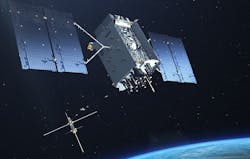America seeks faster ways to launch military satellites
WASHINGTON - By shooting a missile into one of its own satellites in March, India upped the ante. The immediate intention, suggests Jeffrey Caton, a retired American air-force colonel who teaches at the Army War College, was to fire “a shot across the bow” of India’s rival China. The Chinese had, after all, blown up one of their own satellites in 2007, in a similar demonstration of their ability to do such things. India’s test, along with the wider profusion of anti-satellite weapons, has lent credence to the worries of defense chiefs around the world who believe that future conflicts between great powers will stretch into space, writes The Economist. Continue reading original article
The Intelligent Aerospace take:
December 6, 2019-Vice-chairman of America’s Joint Chiefs of Staff John Hyten has noted that America's high-dollar, high-tech satellites make for “big, fat, juicy targets," as The Economist notes in their piece. While the U.S. military is able to largely do what forward-deployed observers used to do in the 20th century with technology, that tech is tenuous. India and China have demonstrated their abilities to destroy targeted satellites in space and other nations no doubt could zero in enemy state's satellites as well. With that in mind, the United States looks to leverage private space launch companies like Rocket Lab and Relativity Space. In addition, the U.S. Air Force is looking to smaller firms for big ideas in the world of tech in their "pitch" events. Finally, DARPA has challenged industry to make multiple launches in just a few days or weeks - no easy task.
"It is a measure of the task’s difficulty that, of the 55 teams which signed up initially, only three qualified, and two have subsequently dropped out," The Economist notes in its story. "The name of the remaining competitor is secret."
For America to maintain its technological advantage on the battlefield, it must keep its existing satellites operating in orbit, or have the ability to replace them in the event of a malicious actor taking them out of commission.
Related: India announces it shot down a satellite
Related: USAF 'Space Fence' detects debris from India anti-satellite test
Related: Airbus and Telespazio join forces on military satellite services on Syracuse IV satellites
Jamie Whitney, Associate Editor
Intelligent Aerospace
